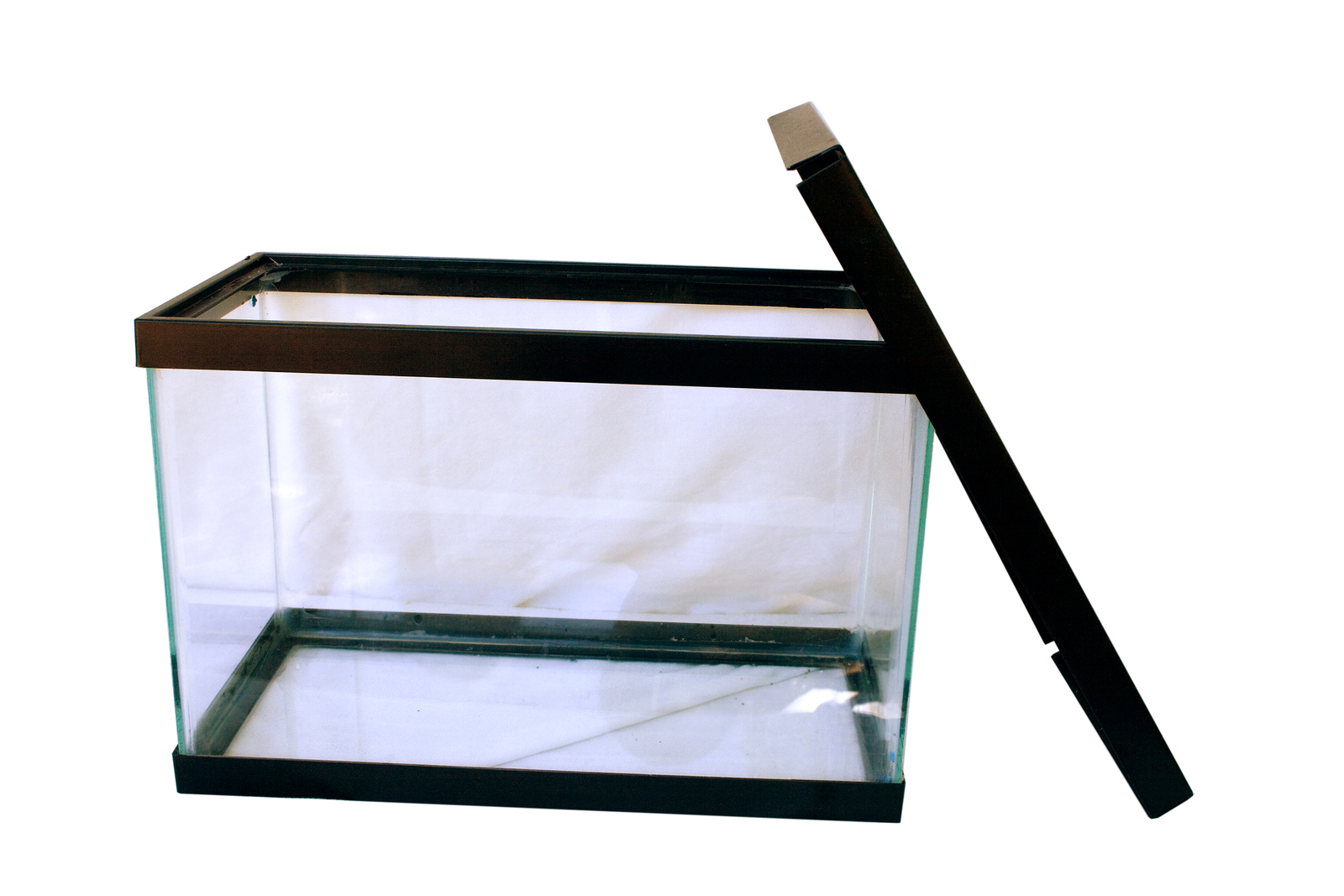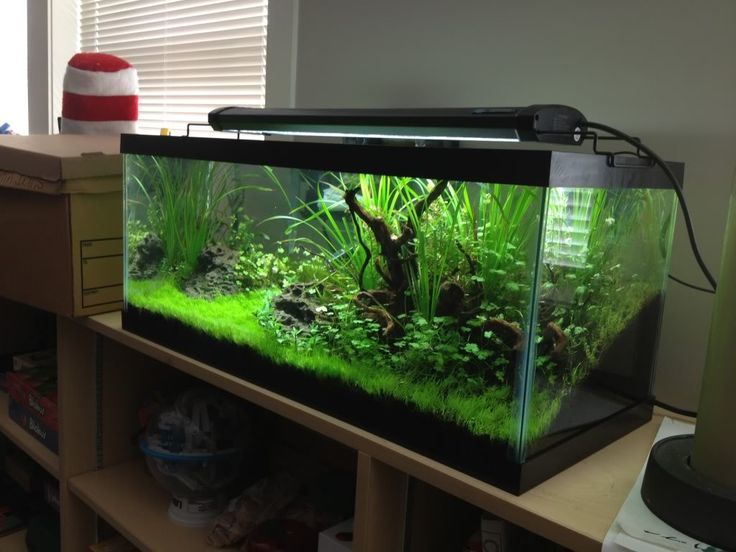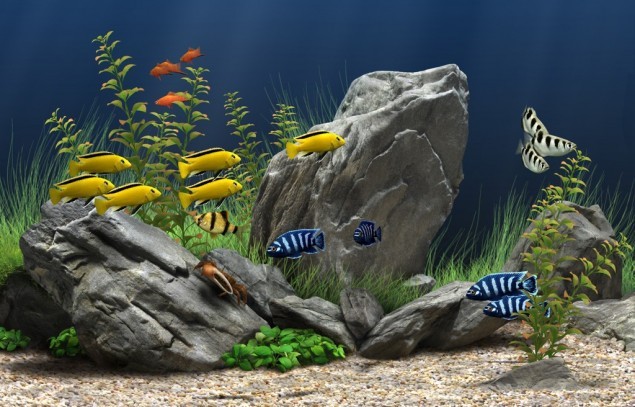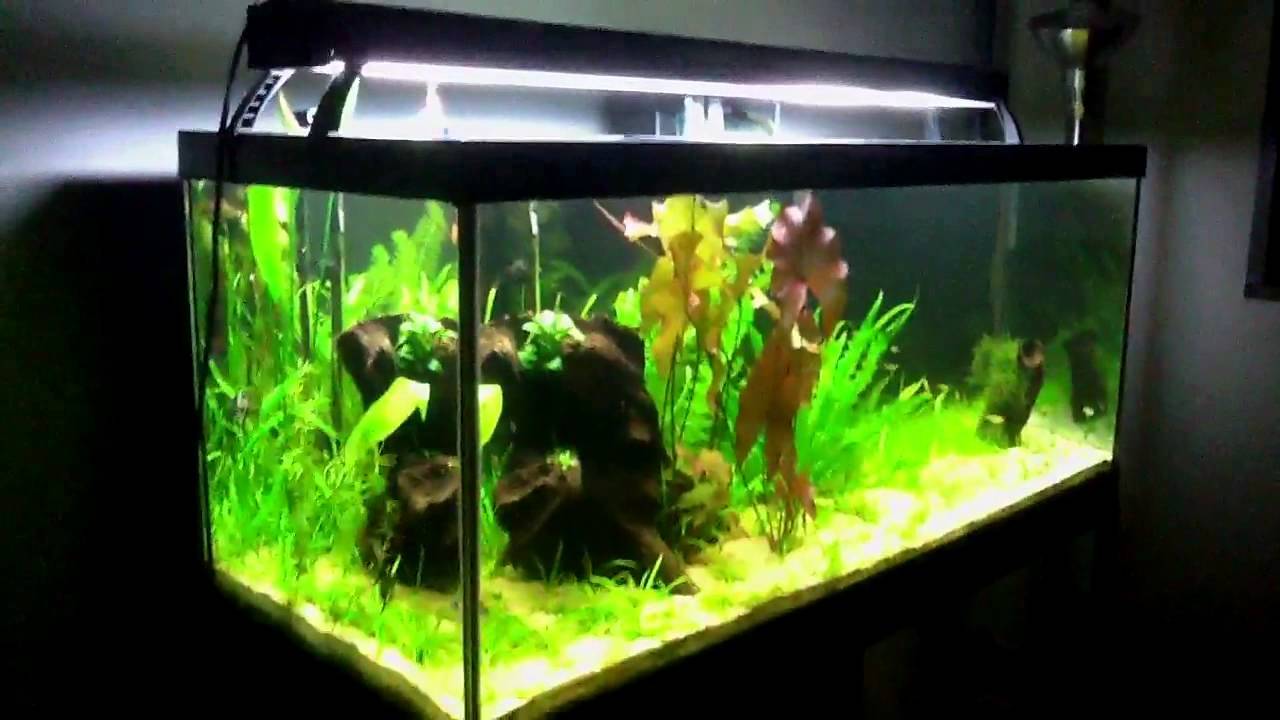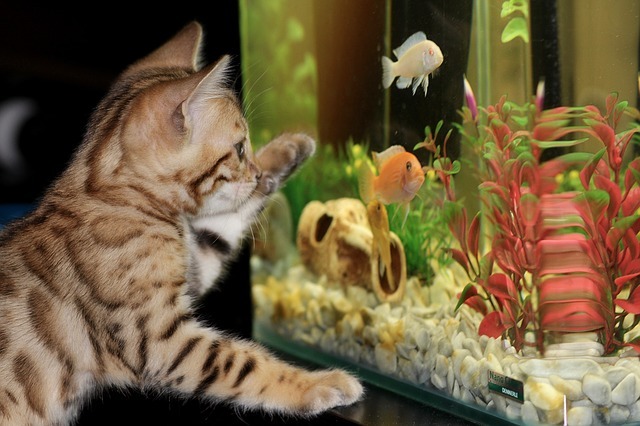Best Freshwater Aquarium Setup
Update on: August 1, 2025

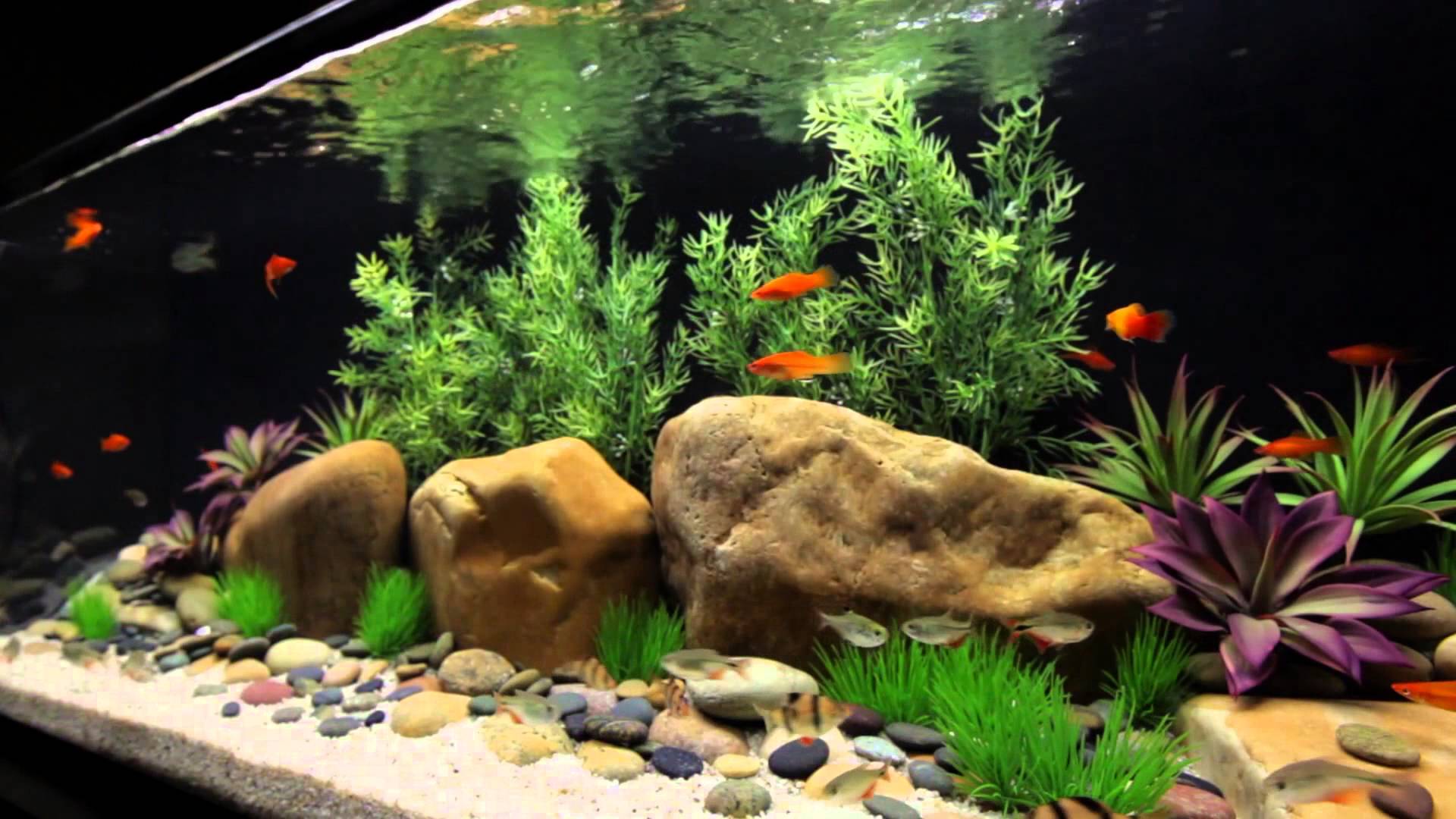
You may be seeking the type of pet that requires as little maintenance as possible, but at the same time can offer you a great deal of pleasure and relaxation.
If that is the case, a freshwater aquarium is just the ticket for you.
Freshwater aquariums are easy to maintain, they are clean, they offer the best type of tranquility and relaxation, almost regardless of where you locate it in your home or office.
Starting a Freshwater Aquarium
In this section, I’ll walk you through the essential steps and components needed to set up a successful freshwater aquarium.
Step 1: Choosing the Best Freshwater Tank Size
The first step in your aquarium adventure is selecting the right tank size. As a general rule, bigger is better when it comes to aquariums. Larger tanks provide a more stable environment for your fish and allow for a greater variety of species.
When I started, I opted for a 20-gallon tank, which proved to be a great size for a beginner. It was large enough to create a diverse ecosystem but not too overwhelming to maintain.
A 20-gallon tank is a fantastic starting point for beginners, as it offers ample space for your finned friends while still being manageable.
- Shape: Opt for a rectangular or square tank, as they provide better swimming space and viewing angles.
- Material: Glass or acrylic? Both have their pros and cons. Glass is more scratch-resistant and affordable, while acrylic is lighter and offers better insulation.
Step 2: Invest in The Right Freshwater Tank Equipment
To create a healthy and thriving freshwater tank, you’ll need to equip your tank with the following essential items:
- Filtration System: A reliable filter is the heart of your freshwater aquarium, keeping the water clean and free of harmful toxins. Hang-on-back (HOB) filters and canister filters are popular choices for their efficiency and ease of maintenance.
- Heater: Most tropical fish require a consistent water temperature between 75-80°F (24-27°C). An adjustable heater will help maintain a stable temperature and keep your fish comfortable.
- Lighting: Proper lighting not only enhances the beauty of your freshwater tank but also supports the growth of live plants and helps establish a natural day-night cycle for your fish.
- Substrate: Gravel or sand substrate provides a natural look and serves as a foundation for beneficial bacteria that break down waste.
- Decorations: Rocks, driftwood, and ornaments create hiding spots and territories for your fish while adding visual appeal to your tank.
Step 3: Cycle Your Freshwater Tank
Before introducing fish to your new tank, you must cycle your tank to establish a healthy nitrogen cycle. This process involves allowing beneficial bacteria to grow and convert harmful ammonia and nitrites into less toxic nitrates.
Patience is key during this stage, as it can take several weeks for the cycle to complete. You can speed up the process by using a bacterial starter or adding a few hardy fish to kickstart the cycle.
Step 4: Adding Substrate and Decorations
With your freshwater tank cycled and ready, it’s time to create a visually stunning underwater landscape. Start by adding a layer of substrate (gravel or sand) to the bottom of your tank. This not only looks natural but also provides a surface for beneficial bacteria to colonize.
Next, arrange your decorations, such as rocks, driftwood, and artificial plants. These elements not only enhance the aesthetic appeal of your aquarium but also provide hiding spots and territories for your future fish inhabitants.
Step 5: Choosing The Best Fish for a Freshwater Tank
Now comes the exciting part – choosing your freshwater tank fish!
As a beginner, you should select fish species that are hardy, easy to care for, and compatible with one another. Some of the best and beginner-friendly freshwater tank fish include:
- Guppies: These colorful livebearers are easy to care for and add a vibrant splash of color to your tank.
- Neon Tetras: These small, schooling fish are known for their iridescent blue stripes and peaceful temperament.
- White Cloud Mountain Minnows: Hardy and adaptable, these active swimmers are a great choice for beginners.
- Cherry Barbs: These attractive, red-colored fish are peaceful and thrive in planted tanks.
Remember to research the specific requirements of each species and ensure they are compatible before adding them to your aquarium.
Step 6: Adding Fish To Your Freshwater Tank
When introducing new fish to your aquarium, you should acclimate them slowly to minimize stress and prevent illness. This process involves gradually adjusting the fish to the temperature, pH, and water chemistry of your tank.
- Acclimate: Float the sealed bag containing your fish in the aquarium for 15-30 minutes to allow them to adjust to the water temperature.
- Slowly add water: Open the bag and gradually add small amounts of aquarium water to the bag over 30 minutes.
- Release your fish: Gently net your fish and release them into their new home. Avoid pouring bag water into the aquarium.
Step 7: Maintaining Your Freshwater Aquarium
Congratulations! You’ve successfully set up your freshwater aquarium.
However, your journey as an aquarist has only just begun. Regular maintenance is important to keep your tank healthy and your fish thriving.
- Perform weekly water changes
- Vacuum the substrate, and
- Monitor water parameters using a reliable test kit.
- Feed your fish a balanced diet, and avoid overfeeding to minimize waste accumulation
As you gain experience and confidence in your fishkeeping skills, you can explore more advanced aspects of the hobby, such as aquascaping, breeding, and keeping more challenging freshwater fish species.
How to setup your fresh water Aquarium
Once you have decided to give tropical fish a try in your home or office, there are some steps you should follow before setting up your freshwater tropical fish aquarium. First, it is very important to realize that if you are a first-time fish owner, a freshwater aquarium is easier to care for than a saltwater fish tank.
Once you have mastered the care, maintenance, and complexities of your freshwater tropical fish aquarium and want to expand your new aquarium hobby, a saltwater aquarium can be your expansion.
But you may not need or want to expand to a saltwater aquarium, since a freshwater aquarium can provide pleasure and relaxation for years, both for you and your fish.
Like any other type of pet that you could ever own, a freshwater tank will require care and maintenance.
The most important factor is keeping your fish healthy and happy will be the aspect of cleanliness. This will require cleaning of your freshwater tropical fish aquarium, although the extent of specific duties of that cleaning will vary depending on the type of fish tank you have acquired, and the kind of pump and aquarium filter you got.
You will also want to watch your tank daily to ensure that the water remains properly balanced for your fish and maintains a comfortable and recommended temperature for them.
The last item that you will need to perform regularly is to feed your fish either daily or every other day, depending on the specific requirements of the type of fish you have.
Selecting your Freshwater Tropical Fish Aquarium
Once you are sure that you can handle the regular maintenance of your fresh water fish, it is time to go shopping for your tank.
Size
A freshwater tropical fish aquarium needs to be big enough to hold the number of fish that you plan to put into it, since overcrowding a tank can lead to polluted aquarium water and diseased fish.
Some people decide on how many fish they want to have in their tank and then choose the size of tank accordingly. Other aquarists have a specific limitation on the size of tank they can accommodate in their home or office, and therefore the number of fish they can have is already determined by the tank size.
Make sure you find out how large your fish will grow to be since size can vary greatly in the different types of fish available. A beginner might do well to start with a 10 or 20-gallon tank and a few fish of smaller and heartier types.
Water Choices
You even have a choice in what type of water you can use with freshwater aquariums and they are: filtered tap water, which is probably the cheapest or you can use bottled water which is already filtered for you.
One problem is that tap water in some areas of the country contains fluoride, which for humans, helps prevent tooth decay and is healthy for teeth. If this is the case where you live, you should use bottled water from the grocery store.
Necessary Accessories
You will also need to equip your freshwater tropical fish aquarium with a water filtration system, a good heater, and accessories to jazz up your tank and keep your fish happy.
When you bring your freshwater tropical fish aquarium home, find a location where the light and temperature will remain consistent.
Heater vents and bare windows can affect these water factors, which will not be good for your fish.
Bear in mind that once your freshwater tropical fish aquarium is filled with water, it will be extremely heavy, so make sure your flooring is solid underneath and don’t plan on shifting your tank at all once it is full of water.
Keeping Your Tank Healthy
The size of the tank you choose should be proportionate to the number of fish you have. If this is your first fish tank aquarium, a small tank is recommended to start with until you start feeling more comfortable with the aquarium maintenance routine.
Starting with a small freshwater aquarium will help you learn the basics in taking care of fish as well as keeping all costs to a minimum until you decide you want to expand with a more expensive or elaborate and complex setup.
The next step you need to consider is where you will place your freshwater aquarium. The main point is that the weight of the aquarium needs attention.
A small tank of say ten gallons will weigh around 85 pounds therefore placing it in a safe place where it cannot be knocked off by mistake is definitely recommended.
Now that you have the freshwater aquarium and the space where you will place it, you need to decide what you will place in the aquarium besides the fish such as: the plants, gravel and other decorations that match your personality and or décor. Aquarium decorations are vast, from plastic castles to office desk set-ups, so you can customize the inside to suit your mood and style.
Helpful Tips
Change the water of your aquarium at least once a month in order to keep everything clean and your fish in good health. Start with just a few fish and if you feel comfortable with your new hobby you can always add on and also expand the size of your aquarium.
An aquarium is a great source of relaxation so take your time when you clean your tank and do a good job; it will slowly but steadily grow on you, as you will enjoy the time with your new pals.
Tropical fish are a beautiful addition to your life, and a freshwater tropical fish aquarium can bring serenity to your home.
With a little research, you can keep your fish healthy and happy so that they will be there for your enjoyment for many years.
\[su_divider top=“no” style=“double” divider_color=“#f57a21” link_color=“#f70b20” size=“5” margin=“25”\]
\[su_row class=“alsoon”\]
\[su_column size=“1/2”\]
\[su_list icon=“icon: location-arrow” icon_color=“#e76507”\]
- Best Acrylic Aquariums
- Best 75 Gallon Aquariums
- Best 55 Gallon Aquarium
- 20 Gallon Fish Tank
- 10 Gallon Fish Tank
- Disease Treatment
- Fish Photography
- Fish Nutrition
- Beginners Guide
- Best Freshwater Fish Tank
\[/su_list\]
\[/su_column\]
\[su_column size=“1/2”\]
\[su_list icon=“icon: location-arrow” icon_color=“#e76507”\]
- Best Saltwater Fish Tank Size
- Saltwater Aquarium Checklist
- Treating Itch
- How to Reduce Ammonia
- Saltwater Aquarium for Beginners
- Best Aquarium Kits
- Aquarium Filters
- About Aquarium Plants
- Understanding Aquarium Filtration
- Best Aquarium Filters Buying Guide
\[/su_list\]
\[/su_column\] \[/su_row\]
